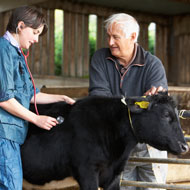
Investigation reveals progress made in addressing key issues
The UK’s chief veterinary officers have welcomed the publication of the latest state-of-the-industry report which examines the health and welfare of cattle in Great Britain.
Published by the Cattle Health and Welfare Group (CHAWG), the report reveals the progress made in the past few years in addressing issues like mastitis, lameness and longevity.
For the first time, CHAWG also looked at the challenges facing the beef and dairy sectors around antimicrobial resistance.
In their joint forward, the UK’s chief vets write that as the possible impacts of the referendum on leaving the EU are considered, the importance of a GB focus on disease control is as important as ever.
“The healthier our animals, the more attractive our products. The better our animal welfare, the greater the confidence of consumers in our production systems,” say Nigel Gibbens, Sheila Voas and Christianne Glossop.
“With the UK Government placing AMR at the top of its risk register alongside terrorism and pandemic ’flu, it is heartening to see that CHAWG, in common with other livestock sectors, has grasped the nettle in looking first at how the cattle sector can better capture data on use of antimicrobials.”
They add that addressing AMR helps address other imperatives, as an emphasis on sound animal husbandry and healthy animals kept to high welfare standards will help minimise routine reliance on antimicrobials.
“Success in controlling endemic disease is one area of considerable importance, and here we can highlight CHAWG’s pivotal role in the development and promotion of national disease control programmes,” they continue.
“These include the launch of the BVDFree scheme in England earlier this year, ongoing progress with BVD eradication in Scotland, the development of a Wales BVD scheme, and the Action Johne’s initiative.”
CHAWG chairman Tim Brigstocke, says the comments are encouraging and provide positive direction for future CHAWG activities. He also reassures that while the report sees many advances in topical areas, ‘core’ activities are not being ignored.
“Effective farm health planning remains the bedrock of good practice. And while we tend to focus on areas which need improvement, it’s worth mentioning that a delegation from the Food & Veterinary Office (FVO) of the European Commission recently visited and were impressed by the coordinated approach taken in this country,” he said.



 The BSAVA has opened submissions for the BSAVA Clinical Research Abstracts 2026.
The BSAVA has opened submissions for the BSAVA Clinical Research Abstracts 2026.